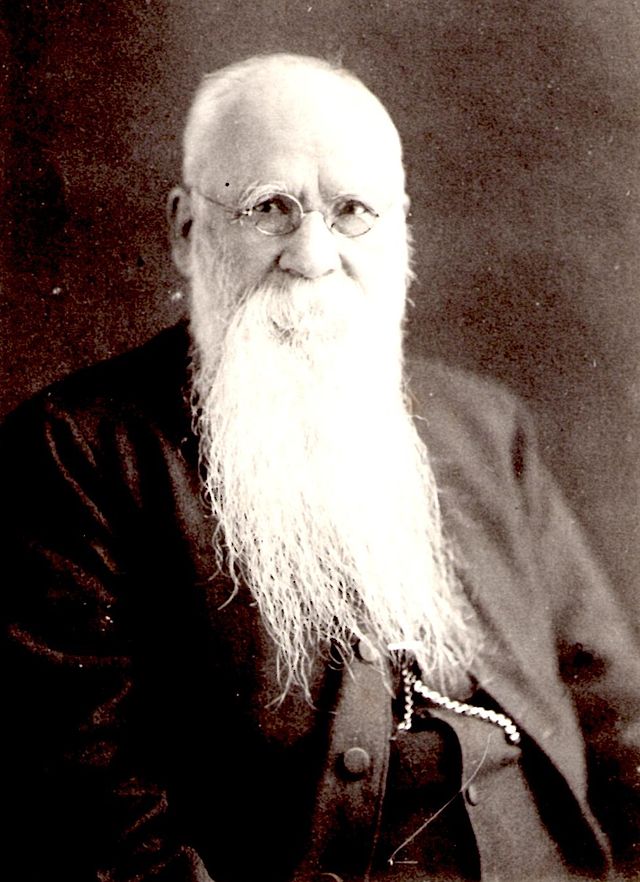 |
| John Batchelor |
Did you know that Japan has another race and language? It’s Ainu. Ainu is an indigenous people in Japan. They originally lived in Ezo (Hokkaido) and had their own traditional cultures and histories. Due to the Meiji Restoration which included modernization and democratization, Japanese people who lived on mainland tried to assimilate the Ainu people to the standard of Japan. At that time, following national trends was usual but Ainu people’s life style was too different from the ordinary Japanese way of life. The Japanese nation’s forcible cultural assimilation made the Ainu confused since the nation prohibited Ainu’s traditional cultures, like earrings for man and tattooing of women. Furthermore, historical festivals, salmon fishing and deer hunting were necessary to survive. Against these policies, missionaries and doctors of foreign countries started the movement to uphold the Ainu’s human rights. John Batchelor was one of them.
John Batchelor was born in England in 1854 and he had 11 brothers. He was born in a wool merchant’s shop and his father was the mayor of Hartsfield city three times. The family was reverent Christian and Batchelor was also baptized. At 14 years old, he left junior high school and tried to be lawyer but he failed to pass the examination so he went on to a night school and engaged in farming. He also graduated from Islington seminary and School of Theology of Cambridge. After that, he entered St. Paul College in Hong Kong when he was 22 years old. However, after three months, he had to move to Japan because he suffered from local disease, malaria. He needed to go to a region which had similar conditions of England, and Japan has the Anglican Church in Hakodate of Hokkaido so he decided to go there.
After he arrived in Hakodate, he started to study Japanese and the Ainu language. One day, he met an Ainu boy and got to know about the cruel situations of the Ainu. Japanese people in the main land tried to cultivate Hokkaido by force, so the Ainu people were forced to be assimilated. In 1878, he visited Sapporo and met Kurotaka Kiyoda who was the leader of development of Hokkaido. The next year, he visited Hiratori and started missionary work. Penriuku, the head of the region, and the villagers were impressed by Batchelor’s enthusiasm. The head decided that Batchelor should stay at his house and teach Ainu language for three months. In 1881, he went back to England and studied divinity again for six weeks at Cambridge University. In 1884 when he was 30 years old, he married Luisa who was a younger sister of the head of Hakodate Anglican Church in the England Embassy in Tokyo. After the marriage, they decided to move to Horobetsu, southern part of Hokkaido and in 1888, he established a school for Ainu there, called Airui-gakkou. In 1892, he moved to Sapporo, the center of Hokkaido. He established a hospital and dormitories for students of the Ainu in Sapporo. Thanks to his donations, lots of Ainu people got a chance to go to school and contribute to Japanese society as teachers, veterinarians and radio operators. In 1932, he won the Order of the Sacred Treasure.
He studied the language and race of the Ainu and made an Ainu-Japanese-English dictionary (Kawaei-Santai-zisho) for the first time. Furthermore, he translated the Bible and hymns to Ainu. In 1940, he had to go back to England due to the outbreak of the world war. He hoped to come to Japan again after the end of the war, however he passed away due to cerebral hemorrhage in 1944 in England. Batchelor had contributed to protecting Ainu’s human rights so he is called “The father of Ainu” even now.
●Discussion questions
Why did he try to propagate Christianity among the Ainu?
Most members think that he wanted to save the Ainu by telling the way of Christianity. Batchelor strongly believed that people who believed in Christianity would be saved so he tried to save the Ainu whose culture was being penetrated by main land people. One member thought he want to invade Hokkaido by brainwashing the Ainu.
●Feelings about the person
Batchelor had a strong sense of justice to relieve the Ainu people. Japanese people who lived next to them could not think about Ainu’s feelings. However Batchelor, who came from a far away country, devoted his whole life to the Ainu. Most Japanese people, including me, did not know about him. I think Japanese education should add more power to history classes of compulsory education because Japanese people tend to judge other countries by only media reports or some superficial impressions, so knowing their heroes and admire them countries. I want a lot of Japanese people to know about his great achievements and cultivate a better understanding of foreign people.
【Reference list】
Morimoto, M. (2011). HOMAS (Japanese ver.) Retrieved January 14, 2015 from Hokkaido/ Massachusetts Society web site: http://www5.ocn.ne.jp/~homas/
Yamamoto, H. (2011). Hokkaido history walker. Retrieved January 14, 2015 from Hokkaido.net web site: http://rekitan.namara-hokkaido.net/column/?id=412
No comments:
Post a Comment